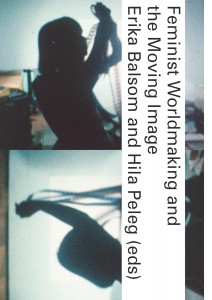Feminist Worldmaking and the Moving Image
Sous la direction de Erika Balsom et Hila Peleg


Moyenne des votes : ![]()
| 0 | vote | |
| 0 | vote | |
| 0 | vote | |
| 0 | vote |
Votre vote : -
Description de l'ouvrage:
Intersectional, intergenerational, and international perspectives on nonfiction filmmaking by women, generously illustrated, with film stills and other images.
This book offers intersectional, intergenerational, and international perspectives on nonfiction film- and videomaking by and about women, examining practices that range from activist documentaries to avant-garde experiments. Concentrating primarily on the period between the 1970s and 1990s, the contributions revisit major figures, contexts, and debates across a polycentric, global geography. They explore how the moving image has been a crucial terrain of feminist struggle—a way of not only picturing the world but remaking it.
The contributors consider key decolonial filmmakers, including Trinh T. Minh-ha and Sarah Maldoror; explore collectively produced films with ties to women’s liberation movements in different countries; and investigate the cinematic expressions of tensions and alliances between feminism and anti-imperialist struggles. They grapple with the need for a broader more inclusive definition of the term “feminism”; meditate on the figure of the grandmother; reflect on realist aesthetics; and ask what a feminist film historiography might look like.
The book, generously illustrated with film stills and other images, many in color, offers ten original texts, two conversations, and eight short essays composed in response to historical texts written by filmmakers. The historical texts, half of which are published in English for the first time, appear alongside the essays.
Contributors
Helena Amiradżibi, Madeleine Bernstorff, Teresa Castro, Counter Encounters (Laura Huertas Millán, Onyeka Igwe, Rachael Rakes), Ayanna Dozier, Forough Farrokhzad, Safi Faye, Devika Girish, Elena Gorfinkel, Haneda Sumiko, Shai Heredia, Juliet Jacques, Sarah Keller, Nzingha Kendall, Julia Lesage, Beatrice Loayza, Janaína Oliveira, Lakshmi Padmanabhan, Yasmina Price, Elizabeth Ramírez-Soto, Pooja Rangan, Lis Rhodes, Sara Saljoughi, Rasha Salti, Isabel Seguí, Chick Strand, Monika Talarczyk, Trinh T. Minh-ha, Françoise Vergès, Claudia von Alemann, Mitsuyo Wada-Marciano, Shilyh Warren, Giovanna Zapperi
À propos des auteurs :
Erika Balsom is Reader in Film Studies at King’s College London and the author of four books, including TEN SKIES and After Uniqueness: A History of Film and Video Art in Circulation. Hila Peleg is Associate Curator at the Haus der Kulturen der Welt (HKW), Berlin and was formerly Artistic Director of the Berlin Documentary Forum. Balsom and Peleg are coeditors of Documentary Across Disciplines (HKW/MIT Press).
Voir le site internet de l'éditeur The MIT Press
> Des mêmes auteurs :
Alanis Obomsawin (2022)
Lifework
Dir. Richard William Hill et Hila Peleg
Sujet : Director > Alanis Obomsawin
Artists' Moving Image in Britain Since 1989 (2019)
Dir. Erika Balsom, Lucy Reynolds et Sarah Perks
Sujet : Genre > Experimental
After Uniqueness (2017)
A History of Film and Video Art in Circulation
de Erika Balsom
Sujet : Genre > Experimental
> Sur un thème proche :
Sustainable Resilience in Women's Film and Video Organizations (2024)
A Counter-Lineage in Moving Image History
Sujet : Sociology
Independent Women (2023)
From Film to Television
Dir. Claire Perkins et Michele Schreiber
Sujet : Sociology
The Avenging-Woman On-Screen (2023)
Female Empowerment and Feminist Possibilities
de Lara C. Stache et Rachel D. Davidson
Sujet : Sociology
Incomplete (2023)
The Feminist Possibilities of the Unfinished Film
Dir. Alix Beeston et Stefan Solomon
Sujet : Sociology
There She Goes Again (2023)
Gender, Power, and Knowledge in Contemporary Film and Television Franchises
Sujet : Sociology
Radical Equalities and Global Feminist Filmmaking (2022)
An Anthology
Dir. Bernadette Wegenstein et Lauren Benjamin Mushro
Sujet : Sociology